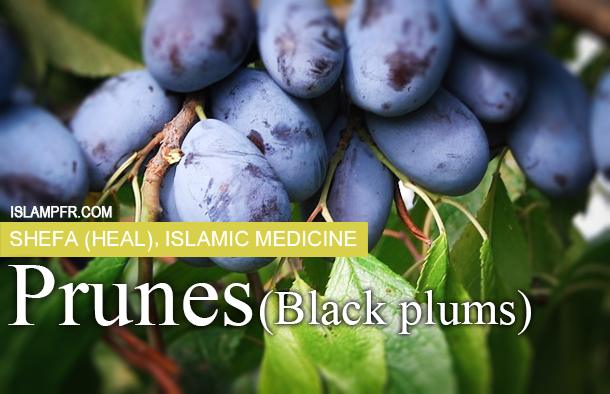Prunes – good for body temperature
مُحَمَّدُ بْنُ يَحْيَى عَنْ عَبْدِ اللَّهِ بْنِ جَعْفَرٍعَنْ يَعْقُوبَ بْنِ يَزِيدَ عَنْ زِيَادٍ الْقَنْدِيِّ قَالَ: دَخَلْتُ عَلَى أَبِي الْحَسَنِ الْأَوَّلِ ع وَ بَيْنَ يَدَيْهِ تَوْرُ مَاءٍ فِيهِ إِجَّاصٌ أَسْوَدُ فِي إِبَّانِهِ فَقَالَ إِنَّهُ هَاجَتْ بِي حَرَارَةٌ وَ إِنَّ الْإِجَّاصَ الطَّرِيَّ يُطْفِئُ الْحَرَارَةَ وَ يُسَكِّنُ الصَّفْرَاءَ وَ إِنَّ الْيَابِسَ مِنْهُ يُسَكِّنُ الدَّمَ وَ يَسُلُّ الدَّاءَ الدَّوِيَّ.
اصول کافی، جلد 6، صفحه 359، حدیث 1.
Ziad Qandi has narrated: “I went to Imam Kazim ᴾᴮᵁᴴ (The Seventh Shia Imam), there was a water container and some prunes (black plums) which he was putting in it. The Imam said: ‘my temperature has increased and fresh prune decreases temperature and removes bile. Dried prunes soothes blood and removes incurable pains.’”
Usul Al-Kafi, vol.6, p.359. Hadith: 1
Scientific proof
Department of Pharmacology & Therapeutics, Shifa College of Medicine, Islamabad, Pakistan
BACKGROUND:
Fruits and vegetables are shown to reduce blood pressure. It is not merely the antioxidants contained in fruits and vegetables that have health benefits such as lowered systolic and diastolic blood pressures. This study was undertaken to see the cardiovascular protective effects of prunes.
METHODS:
A placebo controlled clinical trial study was designed to see the effects of Prunus domestica on blood pressure in 259 pre-hypertensive (Systolic BP = 120-139 mmHg, diastolic BP = 80-89 mmHg) volunteers. Treated groups drank prune juice and ate the whole fruit (dried plums) while either 3 (about 11.5 gm) or 6 prunes were soaked overnight in a glass of water whereas control group took only a glass of plain water early in the morning on empty stomach. Blood pressure was recorded fortnightly for 8 weeks, and blood samples were taken at 0 and 8 weeks.
RESULTS:
There was significant reduction of blood pressure by single dose of prunes daily group and the controls (p < 0.05). With the double dose of prunes, only systolic BP was reduced significantly (p < 0.05). Control group had significantly increased serum HDL whereas test groups had significantly reduced serum cholesterol and LDL (p < 0.05). Data was analysed by paired-sample t-test with 95% confidence interval.
CONCLUSION:The data predicts cardiovascular protective effects of prunes.
https://www.ncbi.nlm.nih.gov/pubmed/21409897






